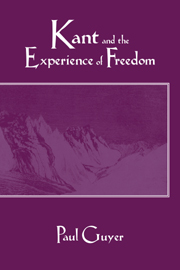Book contents
- Frontmatter
- Contents
- Preface
- Note on citations
- Introduction
- KANT'S AESTHETICS IN HISTORICAL CONTEXT
- KANT'S AESTHETICS AND MORALITY: TOPICAL STUDIES
- Chapter 6 The beautiful and the sublime
- Chapter 7 Nature, art, and autonomy
- Chapter 8 Genius and the canon of art: a second dialectic of aesthetic judgment
- Chapter 9 Duties regarding nature
- Chapter 10 Duty and inclination
- Notes
- Bibliography
- Index
Chapter 10 - Duty and inclination
Published online by Cambridge University Press: 05 March 2012
- Frontmatter
- Contents
- Preface
- Note on citations
- Introduction
- KANT'S AESTHETICS IN HISTORICAL CONTEXT
- KANT'S AESTHETICS AND MORALITY: TOPICAL STUDIES
- Chapter 6 The beautiful and the sublime
- Chapter 7 Nature, art, and autonomy
- Chapter 8 Genius and the canon of art: a second dialectic of aesthetic judgment
- Chapter 9 Duties regarding nature
- Chapter 10 Duty and inclination
- Notes
- Bibliography
- Index
Summary
In most of the preceding chapters I have approached the links between Kant's ethics and aesthetics from the side of the latter. I have argued that much of the novelty of Kant's approach arises from his exploitation of aesthetic phenomena for purposes of what I initially called “moral epistemology” rather than “moral psychology.” That is, I have emphasized Kant's thought that the aesthetic experience of the freedom of the imagination in the response to beauty and of the power of reason in the feeling of the sublime can make our practical freedom palpable to us, thus supplementing the entirely nonexperiential inference of our freedom from our obligation under the moral law to which Kant had come to restrict us by the theory of the Critique of Practical Reason. But this is not to deny that Kant has left room for the more traditional use of aesthetics in moral psychology, that is, for the claim that “the beautiful prepares us to love something, even nature, apart from any interest” (CJ, §29 General Remark, 5:267). Yet this raises a fundamental issue: How can any possible effect of aesthetic experience on what we might ordinarily be tempted to call our “moral sentiments” be of the least interest to the Kant whose conception of duty and moral worth is usually supposed to have excluded any role for sentiment whatever?
- Type
- Chapter
- Information
- Kant and the Experience of FreedomEssays on Aesthetics and Morality, pp. 335 - 394Publisher: Cambridge University PressPrint publication year: 1993
- 18
- Cited by

